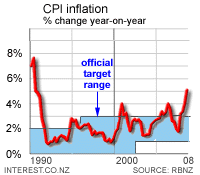 JP Morgan expects the economy will start growing again in early 2009 after a series of interest rate cuts by the Reserve Bank of New Zealand. It has, however, forecast New Zealand inflation will continue to rise to a peak of 5.2% in the fourth quarter, which will restrain the Reserve Bank from making bigger and faster cuts.
The forecast from JP Morgan is based on the expectation that the Reserve Bank of New Zealand (RBNZ) will make three 25 basis point cuts in the official cash rate (OCR) this year, including one each in September, October and December. This would leave the OCR at 7.25% by the end of the year. JP Morgan forecasts the OCR to be 6.25% by mid 2009, although it acknowledges that this will depend on how the economy responds to RBNZ policy changes.
JP Morgan said it believed the 2008 recession will be shallow and short-lived, forecasting GDP growth of 1.5% in 2009. However, the forecast indicated that the recession will get worse before the economy starts to recover, with recession in the second and third quarters this year. It expects GDP growth to stagnate in the fourth quarter.
"Our forecast calls for GDP growth to recover to 1.5% in 2009, thanks mainly to the forthcoming personal income tax cuts, lower interest rates, increased government spending, less drag from the housing market, and the anticipated positive impact on exports on weaker NZD, which has come under significant selling pressure in recent weeks," said JP Morgan economist Helen Kevans.
JP Morgan believed that although the RBNZ had embarked on an extended easing cycle of the OCR, the chances of cuts of 50 basis points were low due to the desire to avoid an inflationary plunge in the New Zealand dollar.
JP Morgan expects the economy will start growing again in early 2009 after a series of interest rate cuts by the Reserve Bank of New Zealand. It has, however, forecast New Zealand inflation will continue to rise to a peak of 5.2% in the fourth quarter, which will restrain the Reserve Bank from making bigger and faster cuts.
The forecast from JP Morgan is based on the expectation that the Reserve Bank of New Zealand (RBNZ) will make three 25 basis point cuts in the official cash rate (OCR) this year, including one each in September, October and December. This would leave the OCR at 7.25% by the end of the year. JP Morgan forecasts the OCR to be 6.25% by mid 2009, although it acknowledges that this will depend on how the economy responds to RBNZ policy changes.
JP Morgan said it believed the 2008 recession will be shallow and short-lived, forecasting GDP growth of 1.5% in 2009. However, the forecast indicated that the recession will get worse before the economy starts to recover, with recession in the second and third quarters this year. It expects GDP growth to stagnate in the fourth quarter.
"Our forecast calls for GDP growth to recover to 1.5% in 2009, thanks mainly to the forthcoming personal income tax cuts, lower interest rates, increased government spending, less drag from the housing market, and the anticipated positive impact on exports on weaker NZD, which has come under significant selling pressure in recent weeks," said JP Morgan economist Helen Kevans.
JP Morgan believed that although the RBNZ had embarked on an extended easing cycle of the OCR, the chances of cuts of 50 basis points were low due to the desire to avoid an inflationary plunge in the New Zealand dollar.
RBNZ will stop long recession, says JP Morgan
RBNZ will stop long recession, says JP Morgan
25th Aug 08, 3:56pm
by

We welcome your comments below. If you are not already registered, please register to comment
Remember we welcome robust, respectful and insightful debate. We don't welcome abusive or defamatory comments and will de-register those repeatedly making such comments. Our current comment policy is here.